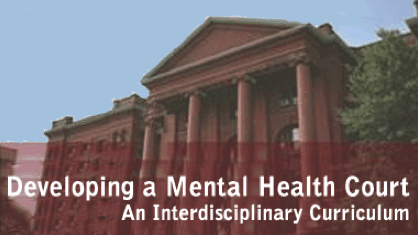Developing a Mental Health Court: An Interdisciplinary Curriculum
Introduction to Behavioral Health
Developing a Mental Health Court is a free multimedia curriculum with the information teams need to plan, implement, sustain, or simply learn about mental health courts based on research and best practices from the field. It is a crucial one-stop resource for judges, behavioral health treatment providers, court managers, judicial educators, probation officers, and many others.
 Do you want to better understand the needs of individuals with behavioral health issues and ensure coordinated treatment and court supervision? Start with Introduction to Behavioral Health, the curriculum’s first introductory lesson. Featuring a presentation and list of resources for further learning, this lesson describes the components of the mental health and substance abuse systems, gives the symptoms and basic terminology of mental illnesses and co-occurring substance use disorders (CODs), and sets forth the principles of effective treatment for mental illnesses and CODs.
Do you want to better understand the needs of individuals with behavioral health issues and ensure coordinated treatment and court supervision? Start with Introduction to Behavioral Health, the curriculum’s first introductory lesson. Featuring a presentation and list of resources for further learning, this lesson describes the components of the mental health and substance abuse systems, gives the symptoms and basic terminology of mental illnesses and co-occurring substance use disorders (CODs), and sets forth the principles of effective treatment for mental illnesses and CODs.
The sharp rise in school shootings over the past 25 years has led school officials across the U.S.…
Read MoreA three-digit crisis line, 988, launched two years ago to supplement—not necessarily replace—911. Calling 988 simplifies access to…
Read More Taking the HEAT Out of Campus Crises: A Proactive Approach to College Safety
Taking the HEAT Out of Campus Crises: A Proactive Approach to College Safety
The sharp rise in school shootings over the past 25 years has led school officials across the U.S. to take a closer look at ways to keep students safe. For Chaffey College in Rancho Cucamonga, California, a tragic incident at a nearby university hit close to home and spurred campus leaders to revisit their own school’s threat assessments and crisis responses.
Read More From 911 to 988: Salt Lake City’s Innovative Dispatch Diversion Program Gives More Crisis Options
From 911 to 988: Salt Lake City’s Innovative Dispatch Diversion Program Gives More Crisis Options
A three-digit crisis line, 988, launched two years ago to supplement—not necessarily replace—911. Calling 988 simplifies access to services when people are seeking help for themselves or loved ones with suicidal thoughts, behavioral health concerns, or substance use-related crises.
Read More Matching Care to Need: 5 Facts on How to Improve Behavioral Health Crisis Response
Matching Care to Need: 5 Facts on How to Improve Behavioral Health Crisis Response
It would hardly be controversial to expect an ambulance to arrive if someone called 911 for a physical health emergency. And yet, for years, the default responders for a behavioral health emergency have been law enforcement officers, not behavioral health professionals.
Read More Finding Solutions to Complex Criminal Justice Issues: Q&A with New CSG Justice Center Advisory Board Member Justice Briana Zamora
Finding Solutions to Complex Criminal Justice Issues: Q&A with New CSG Justice Center Advisory Board Member Justice Briana Zamora
The CSG Justice Center Advisory Board establishes the policy and project priorities of the organization. The board features a cross-section of leaders who shape criminal justice policy in various parts of the country.
Read More











